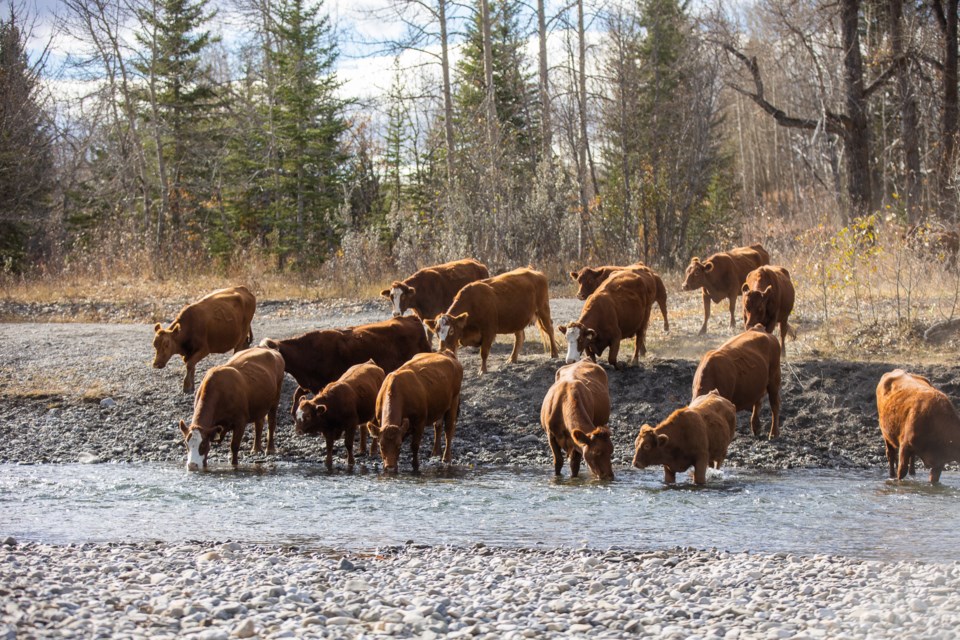Alberta Environment & Protected Areas provided an update in Cochrane on provincial drought conditions predicted for later this year.
The presentation highlighted that several Alberta river basins are facing significant drought conditions due to low rainfall, higher temperatures and lower than average snowpack, increasing the potential for drought conditions in 2024.
Pincher Creek has already spent $1.5 million hauling water, as they saw their intake pipe unexpectedly sticking above the dried-up riverbed.
Darren Bourget, Regulatory Assurance Manager, and Elise Chamberland, Compliance Manager, from Alberta Environment & Protected Areas presented Cocrhane Council with an update.
Alberta Environment has moved to Stage 4 of 5 possible stages but has not yet declared an Emergency under the Water Act.
El Niño is still having an effect on climate here, Bourget said.
Forecasters do “a little happy dance” when they hear of snowfall coming, he said.
“It’s helpful, but it’s not going to get us through this,” he said. “We’re seeing historically low levels in our rivers.”
“The concern we see now is this has become provincial – this is a drought on a provincial scale, not a region scale.”
The reservoirs across the province are already depleted from last year, which forms the dusty background to current concerns.
What’s known as Snow Water Equivalent in the Bow Basin is 67 per cent of normal, as of March 1.
Northwestern and the southeastern Alberta are the two areas on Bourget’s map coloured red – possible areas of extreme drought.
In the northwest, some lakes normally classed as “skimmable”, meaning they are accessible for water bombers to pick up water to fight fires, have completely dried up.
How the province manages water is complex, as there are a number of regulators and water license holders involved. Planning has been ongoing for months now.
If a state of emergency is indeed declared, there needs to be clear understanding of responsibilities – who does what, and when. Forecasting and monitoring are key functions, and the protection of health and human safety are paramount guiding principles.
“I think everyone is aware now (that) this is significant and serious,” Bourget said.
This was Bourget’s second visit to Cochrane in as many months. He was a featured speaker a few weeks ago at the brainstorming session sponsored by the Bow River Basin Council (BRBC), a collaborative, multi-stakeholder, charitable organization that promotes balanced solutions for a healthy watershed.
The province is currently in Stage 4 (“large scale drought conditions”) of drought management planning. There are 51 water advisories in place across the province.
Stage 5 would be the declaration of Emergency (“urgent and critical escalation of drought conditions”) under Section 107 of the Alberta Water Act. This may be needed anytime during summer/fall.
Under Stage 5, emergency measures are need to protect the safety, health or welfare of the public.
Bourget didn’t elaborate on what exact conditions might trigger a jump to Emergency status.
“We’ll know it when we see it,” he said.
Bourget said the province is about to launch a “significant” advertising campaign as well.
Regardless, Alberta municipalities can expect to be asked to conserve water this summer.
Bourget said last year’s State of Local Emergency in Cochrane was a learning experience. One of the things they’d like to address and avoid is some hoarding of water took place, even as residents were asked to pitch in and conserve.
“We did see a water emergency in Cochrane, and also some high water usage during the water shortage," he said. "We want to try to avoid that. I don’t want people to start hoarding water – it’s not effective and it doesn’t help."
He called that behaviour “a natural reaction” that officials will try address.
“We want to try to socialize this at a public level, so people aren’t thinking that way,” he said.
Navigating uncharted waters
A Section 107 State of Emergency has never been declared in Alberta, so departmental officials have been busy briefing cabinet on the nuts and bolts of the legislative framework. A Section 107 declaration would have to come from cabinet.
For an update on drought conditions go to alberta.ca/drought-current-conditions.
The current regulatory framework is couched in terms of rights. Current license holders have priority access to scarce water supplies based on the fact they are considered to have priority rights as outlined in their licenses. Many of these are held by agricultural/irrigation interests.
Should a Stage 5 Emergency be declared, there could be conflicts over who gets how much water, where, and when.
Bourget was candid in his opinion of how well the existing regulatory framework may or may not work, if pressed. That’s why the province has been engaged in discussing water sharing agreements for some weeks now, discussing how to develop tools they’ve never used before. Memorandums of Understanding (MOUs) have been drafted and are being signed.
For example, what happens when a license-holding cattle producer needs water and a nearby town needs to top up their reservoir? The current system isn’t designed to address scenarios like that.
“We don’t want to get hung up in red tape on these things, because it doesn’t think about the important uses of water, it only says ‘I have priority,’” Bourget said.
“That’s a challenge. That’s a challenge for us, under drought,” he said. “I just don’t think it’ll work.”
“I’m absolutely hoping for rain,” Bourget said.
When pressed by Coun. Tara McFadden about whether Cochrane would be able to draw as much water from the Bow River as they have in previous years, Bourget’s response was, “Maybe.”




